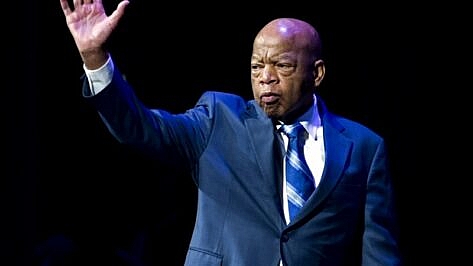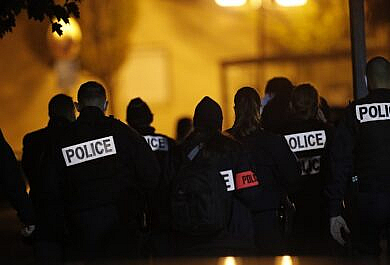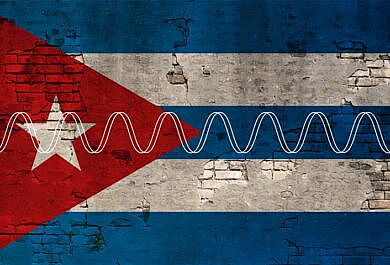On January 19, Senate Democrats tried and failed to create a “filibuster carve-out” to pass the Freedom to Vote: John R. Lewis Act.
Democrats hoped to use the “nuclear option,” or changing Senate rules with a 51-vote majority, but the attempt failed due to opposition from Senators Kyrsten Sinema (D-AZ) and Joe Manchin (D-WV).
- Using the nuclear option would’ve allowed voting rights bills to avoid the typical 60-vote threshold required to end debate on most legislation in the Senate.
- Senator Manchin: “We must never… tear down the only wall…that this nation has against the excesses of the executive branch…and tyranny of the majority.”
- Senate Democrats previously used the nuclear option in 2013 to allow presidential nominations and lower-court judges to be confirmed with a simple majority.
- Senate Republicans then used the nuclear option to eliminate the filibuster for Supreme Court nominations after Democrats filibustered Neil Gorsuch’s nomination in 2017.
- Former President Donald Trump repeatedly urged the Senate GOP to eliminate the legislative filibuster while he was president. They refused.
Attempting the nuclear option was a high risk, high reward play. So why take the risk? The Freedom to Vote: John R. Lewis Act is a massive, 720-page bill that changes almost every aspect of election-related law.
The most controversial provisions of the Freedom to Vote: John R. Lewis Act:
Weakens state Voter ID laws:
- mandates numerous exceptions in case a voter does not have an ID
- allows all prospective voters without IDs to cast provisional ballots
- Broadens definition of acceptable IDs to include birth certificates, college and high school student IDs, utility bills or a bank or debit card
Makes pandemic emergency measures permanent:
- Allows no-excuse vote by mail while banning mail-in ballot voter ID requirements
- Mandatory drop-boxes: Requires each voting jurisdiction provide 24-hour “secured drop-boxes,” accessible for vulnerable groups including the homeless
- Forbids states from restricting curbside voting
- Mandates all states allow 15 days of early voting
Public financing of federal election campaigns:
- Creates a “Democracy Credit” program that allows citizens to request $25 to donate to a federal political candidate or Member of Congress’s campaign
- Establishes a matching fund where congressional campaigns can have their small dollar (<$200) contributions matched up to 600 percent.
Changes voter registration laws nationwide:
- Requires same-day voter registration at every polling place
- States must register 16- and 17-year-old children to vote when they get drivers’ licenses
Federalizes election rules:
- Broadens definition of Dept. of Justice “pre-clearance” to include virtually any changes to local election laws. Now all states and localities must get DOJ approval before changing any local election laws.
Other provisions of the Freedom to Vote: John R. Lewis Act include:
Election Administration
- Makes Election Day a federal holiday
- Mandates polling places at all colleges or universities
- Allows volunteers to establish “mobile polling sites” at long-term care and senior living facilities so seniors, people with disabilities and under guardianships can vote
- Local election officials may only be removed from their positions for “inefficiency, neglect of duty, or malfeasance.”
- Requires poll workers be trained in a “culturally competent manner” and trained with the input of “experts in adult learning.”
Election Integrity
- Institutes an 8-foot buffer zone for poll watchers
- Prohibits states from limiting volunteers from handing out food and water in line unless they are explicitly electioneering
- Mandates post-election audits for all federal elections
- Mandates use of paper ballots and hand counting for recounts and audits
- Tighter eligibility restrictions on election infrastructure vendors (e.g., voting machines)
Voter Registration
- Includes voter registration information with vouchers for certain federal housing, rent and mortgage assistance programs
- Disenfranchising felons released from prison is prohibited, and all Americans who cannot vote due to convictions will have their voting rights restored
New federal crimes with sentences of $100,000 fines or 5 years in prison:
- Preventing or attempting to prevent someone registering to vote
- Harassment of or attempting to harass election workers
- Making false statements about federal elections
Redistricting
- Prohibits partisan and mid-decade restricting and incumbent-protection maps
- Mandates state Congressional delegations be proportional to previous federal election results to avoid partisan advantage
Campaign Finance
- Creates a duty for campaigns to report foreign contacts within 3 days – violations carry a fine of not more than $500,000 and up to 5 years in prison.
- Concealing a foreign contact can be punished with a $1 million fine and up to 5 years in prison
- Restricts advertising and public information campaigns regarding judicial nominations
“Democracy Promotion”
- Creates an “Office of Democracy Advancement and Innovation” to pay states to:
- Distribute payments to candidates for elective office
- Create a campaign fundraising matching fund where taxpayer dollars match private donations
- Institute ranked-choice voting
- Establish independent redistricting commissions
If you’re interested in reading more about this legislation, you can find the full text here. Don’t have time to read the whole bill? Then check out these in-depth analyses from the left and the right.
© Dominic Moore, 2022






